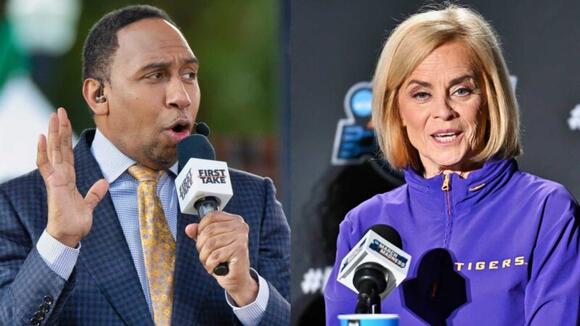LSU head coach Kim Mulkey is criticized by Stephen A. Smith for remarks made during a press conference.
Kim Mulkey, head coach of the Louisiana State University (LSU) women’s basketball team, is no stranger to controversy. Known for her fiery personality and unapologetic approach, she has become one of the most successful coaches in NCAA basketball. However, recently, she found herself at the center of a heated debate after remarks made during a press conference were criticized by ESPN personality Stephen A. Smith.
In this article, we’ll dive deep into the controversy surrounding Kim Mulkey’s comments, the criticisms levied by Stephen A. Smith, and the broader implications of the exchange in the context of sports media, coaching, and public opinion.
The Context: Kim Mulkey’s Press Conference
Kim Mulkey’s press conference was held shortly after LSU’s victory in a critical game. The Tigers had just secured a spot in a major postseason tournament, and Mulkey, as usual, was fielding questions about the team’s performance, future plans, and challenges. However, in the midst of the routine postgame interview, Mulkey made several remarks that quickly drew attention.
Mulkey has always been a coach unafraid to speak her mind, often using press conferences as platforms to express her views on everything from her players’ performance to the state of women’s sports. This time, however, her comments seemed to strike a chord with many, especially those who felt that the tone and content of her statements were divisive or problematic.
The Remarks That Sparked the Controversy
During the press conference, Mulkey made a series of comments that were interpreted as being politically charged. Some of her statements were seen as inflammatory, particularly in the context of the ongoing national conversation surrounding social justice, politics in sports, and the role of athletes as public figures.
One of Mulkey’s more controversial remarks came when she was asked about the impact of political activism within sports, especially after high-profile incidents involving athletes like Colin Kaepernick and others who had used their platform to protest social issues. Mulkey, who has previously remained largely neutral on such matters, made it clear that she did not believe athletes should use their position to make political statements.
“I don’t think sports should be about politics,” Mulkey said, in a tone that suggested frustration. “These young women work hard to get here, and they should be focused on playing the game, not on the noise outside.”
This statement, while seemingly innocuous to some, immediately sparked backlash. Mulkey’s suggestion that athletes should “stick to sports” rubbed many people the wrong way, especially in an era where athletes have increasingly used their platform to speak out on social issues. The phrase “stick to sports” has been a point of contention in recent years, with critics arguing that it dismisses the legitimate concerns and voices of athletes who are using their visibility to push for societal change.
Stephen A. Smith’s Criticism
Stephen A. Smith, a prominent ESPN commentator known for his outspoken opinions, was one of the first to react to Mulkey’s comments. On his show, “First Take,” Smith expressed his displeasure with Mulkey’s stance, calling her remarks “tone-deaf” and “out of touch.”
“I’m disappointed in Kim Mulkey,” Smith began, his voice full of emotion. “For a coach with her stature, someone who’s achieved so much in her career, to suggest that athletes shouldn’t speak out on issues that matter to them? That’s not just wrong, it’s dangerous.”
Smith went on to explain that, in his view, Mulkey’s comments were not only an oversimplification of the issues facing athletes today but also a denial of the historical role sports have played in social movements. He pointed to figures like Muhammad Ali, Jackie Robinson, and Billie Jean King, who all used their platform to challenge the status quo and address systemic injustices. Smith emphasized that sports have always been intertwined with social change, and to ignore that legacy is to ignore the very essence of what makes sports such a powerful force in society.
“To say that sports should be free from politics is to ignore the fact that sports have always been political,” Smith argued. “From the civil rights movement to the fight for gender equality, athletes have been at the forefront of pushing boundaries. Mulkey’s comments aren’t just misinformed—they’re part of a larger trend that tries to silence athletes when they use their voice.”
The Debate Over “Stick to Sports”
The phrase “stick to sports” has become a rallying cry for those who believe that athletes should remain neutral and avoid involvement in political and social issues. It has often been used by critics of athlete activism, who argue that sports should be a place for entertainment and escape, free from the complexities of the outside world.
However, in recent years, more and more athletes have rejected this notion, choosing instead to use their platform to speak out on important issues. From Colin Kaepernick’s protest against police brutality to the widespread support for Black Lives Matter, athletes have increasingly embraced their role as social commentators.
The backlash against Mulkey’s remarks highlights a growing divide in public opinion. Some fans and commentators still hold onto the idea that sports should remain a “neutral” space, where politics and social issues have no place. Others, like Stephen A. Smith, argue that athletes have a responsibility to use their platform to address the injustices they see in the world.
This debate is particularly pertinent in the context of women’s sports. For decades, female athletes have fought for recognition, equality, and opportunities in a landscape that has often overlooked or undervalued their contributions. Many female athletes have used their platform to advocate for gender equality, equal pay, and other issues that directly affect them. To tell these athletes to “stick to sports” is to dismiss their struggle for equity and respect.
The Implications for Kim Mulkey’s Legacy
Kim Mulkey’s legacy as a coach is undeniable. With multiple NCAA championships under her belt, she is widely regarded as one of the greatest coaches in the history of women’s basketball. However, her comments raise important questions about the role of coaches in the modern sports landscape.
Coaches are more than just tacticians; they are mentors, role models, and public figures who wield significant influence over their players and fans. As such, their words carry weight, and in an era where athletes are increasingly vocal about social issues, coaches like Mulkey must navigate the fine line between supporting their players’ autonomy and maintaining their personal beliefs.
Mulkey’s comments about athletes not being political may have been intended to protect her players from the pressures of public scrutiny, but they also inadvertently reflected a more traditional view of coaching that some might argue is outdated. In a time when athletes are expected to be more than just players, coaches too must consider the broader impact of their words and actions.
For Mulkey, the controversy may have long-term implications for her reputation. While many of her supporters will likely defend her right to express her views, the criticism from figures like Stephen A. Smith cannot be ignored. As women’s sports continue to evolve and as athletes become more vocal in their activism, Mulkey may find herself at a crossroads, needing to reconcile her personal beliefs with the changing landscape of sports.
The controversy surrounding Kim Mulkey’s remarks at her press conference and the subsequent criticism from Stephen A. Smith highlights the ongoing tension between sports and politics. In the eyes of some, Mulkey’s comments represent a desire to preserve the traditional, apolitical nature of sports. To others, however, her words reflect a reluctance to embrace the growing trend of athlete activism that is reshaping the sports world.
As the debate continues, one thing is clear: the intersection of sports, politics, and social issues is not going away. Whether Mulkey’s views shift over time or not, this controversy serves as a reminder that in today’s world, athletes and coaches alike must be prepared to engage with the issues of their time—because those issues are increasingly impossible to ignore.



